Innovations Transforming Call Center Training Solutions

Call center training solutions in 2025 are transforming customer service trends through rapid advancements in artificial intelligence, automation, and omnichannel technology. With Sobot AI at the forefront, companies experience significant improvements in agent performance and customer satisfaction as AI-driven tools enhance operational efficiency. Current trends reveal that over 50% of early adopters leverage Sobot call center’s AI capabilities for real-time support, while omnichannel platforms continue to drive business growth and deliver a consistent customer experience. Sobot empowers global brands to elevate both agent performance and customer interactions, providing decision-makers with actionable insights that are shaping the future of call center management.
| Statistic Description | Value / Insight | Source |
|---|---|---|
| Conversational AI will reduce customer service costs by $80 billion by 2026 | $80 billion cost reduction | Gartner |
| Automated agent interactions expected to rise from 1.6% in 2022 to 10% by 2026 | 10% of agent interactions automated by 2026 | Gartner |
| 56% of global business leaders expect generative AI to boost efficiency and productivity | 56% positive outlook on generative AI | Deloitte Digital |
| Over 50% of early adopters use generative AI for drafting responses, real-time support, and summarizing interactions | >50% usage in key AI applications | Deloitte Digital |
| Companies with strong omnichannel engagement strategies see 10% year-over-year growth, 10% higher average order value, and 25% higher close rates | 10% growth, 10% order value, 25% close rate increase | Adobe |
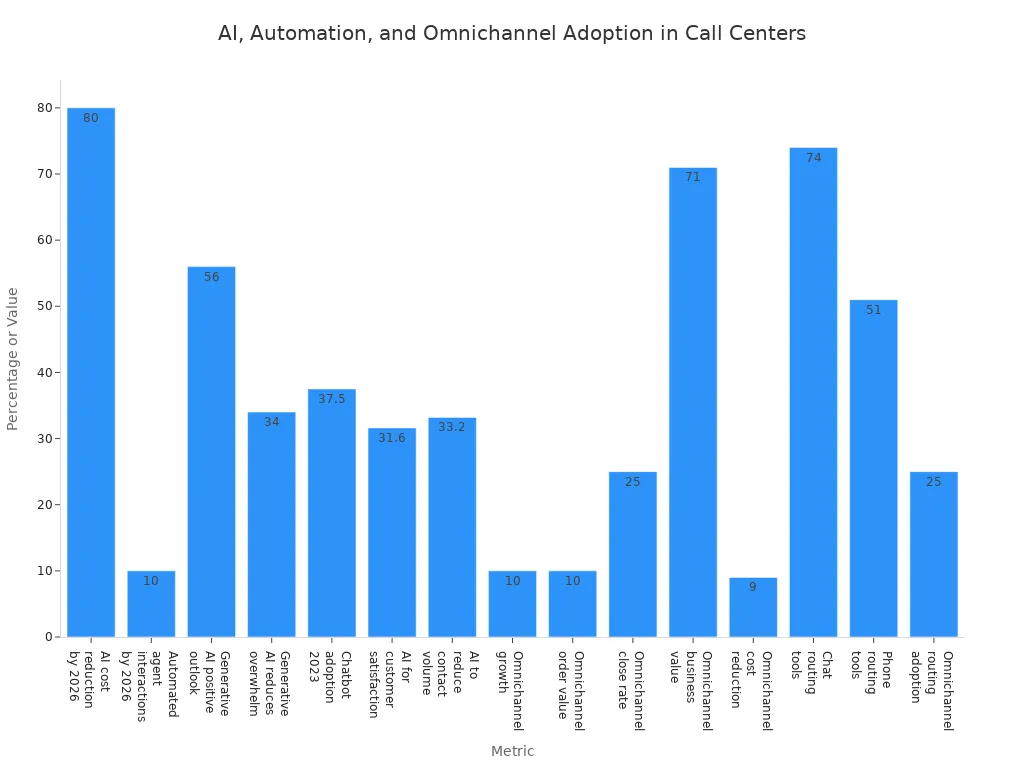
AI in Call Center Training
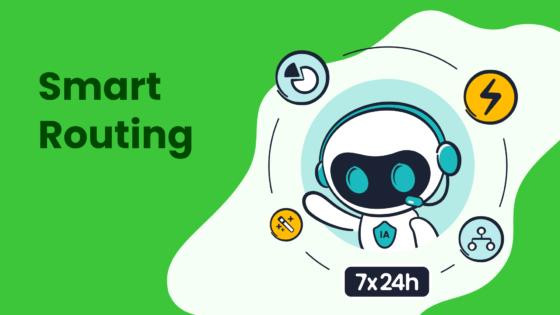
Personalized Learning
Artificial intelligence is revolutionizing call center training by enabling hyper-personalization at scale. Sobot leverages ai-driven tools to create adaptive training programs that respond to each agent’s strengths and weaknesses. Hyper-personalization ensures that every agent receives content tailored to their unique learning needs. This approach increases engagement and accelerates skill development.
- AI-driven personalized learning adapts training pathways based on individual agent performance, enabling tailored skill development.
- Real-time analytics track agent progress and identify specific areas for improvement, allowing dynamic adjustment of training content.
- Personalized feedback mechanisms help pinpoint skill gaps and provide instant guidance, enhancing learning efficiency.
- AI tools standardize training delivery, ensuring uniform quality and reducing variability in agent performance.
- Automated training modules ensure all agents receive consistent instruction aligned with compliance and best practices.
- AI-powered assessments and feedback during live calls enable agents to improve skills in real time, fostering continuous learning.
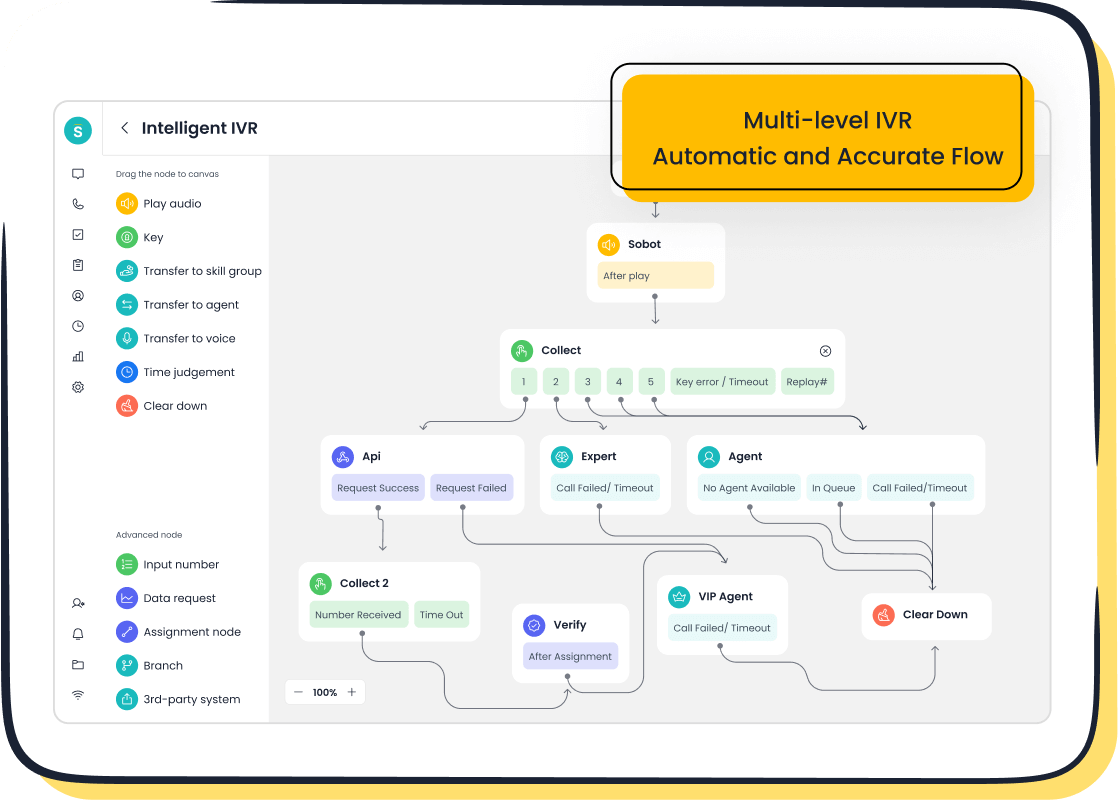
Sobot’s Voice/Call Center platform integrates artificial intelligence to deliver these benefits. The system uses real-time analytics and ai-driven tools to monitor agent performance and adjust training content instantly. This level of hyper-personalization leads to measurable improvements in agent consistency and customer satisfaction.
Real-Time Agent Assistance
Hyper-personalization extends beyond training programs into live customer interactions. Sobot’s ai-powered Voicebot and real-time analytics provide agents with instant access to knowledge bases and customer history. Artificial intelligence delivers real-time suggestions, reducing average handle time and improving first-call resolution rates by up to 15%. Customer satisfaction scores rise by as much as 10% when agents receive immediate, personalized support during calls.
AI-driven tools such as live transcription, sentiment analysis, and ai-generated call summaries empower agents to respond quickly and accurately. Hyper-personalization reduces agent burnout and turnover, boosting confidence and performance. Sobot’s artificial intelligence platform ensures that every customer receives a tailored experience, while supervisors use real-time dashboards to monitor and optimize agent training and performance. This seamless integration of ai, hyper-personalization, and training transforms call center operations and drives operational excellence.
Automation for Training Efficiency
Workflow Automation
Workflow automation has become a cornerstone of modern call center training. Companies now use automation tools to streamline repetitive tasks, reduce manual errors, and accelerate onboarding. By automating processes like data entry, call routing, and post-call documentation, call centers can scale operations without sacrificing quality. For example, robotic process automation (RPA) and ai-powered assistants handle routine tasks, freeing agents to focus on complex customer needs. This shift not only improves productivity but also reduces the time and cost associated with training new agents.
| Company/Brand | Automation Type | Impact on Training Time/Costs | Supporting Data/Outcome |
|---|---|---|---|
| Vodafone | TOBi virtual assistant handling 60% of conversations | Reduced call volume by 15 million annually, lowering labor costs | IBM estimates $0.70 saved per chat; Juniper projects $11B annual savings by 2025 from chatbots |
| Global Telco | Robotic Process Automation (RPA) for CRM wrap-up tasks | Reduced CRM wrap-up time from 4.5 to 1.2 minutes, improving agent productivity and call flow | Freed agents to handle more calls, indirectly reducing training needs by streamlining workflows |
| Zendesk | AI-powered real-time agent assistance | Supported less experienced agents, reducing average handling time by 20% and increasing first contact resolution by 15% | Implies reduced training time due to live support and improved agent performance |
| T-Mobile | AI-based call routing | Cut call transfers by 20%, saving over $10 million annually in agent hours and retraining costs | Direct cost savings in retraining and improved efficiency |
| Leading Retail Brand | Automation of routine queries enabling role redesign and upskilling | Retrained 30% of team for higher-value roles, increasing cross-sell rates by 18% | Automation reduced training costs by shifting agents to more skilled roles |
| General Impact | Automation reducing mental load and burnout | Lower turnover leads to reduced recruitment and training costs | Improved agent morale and productivity |
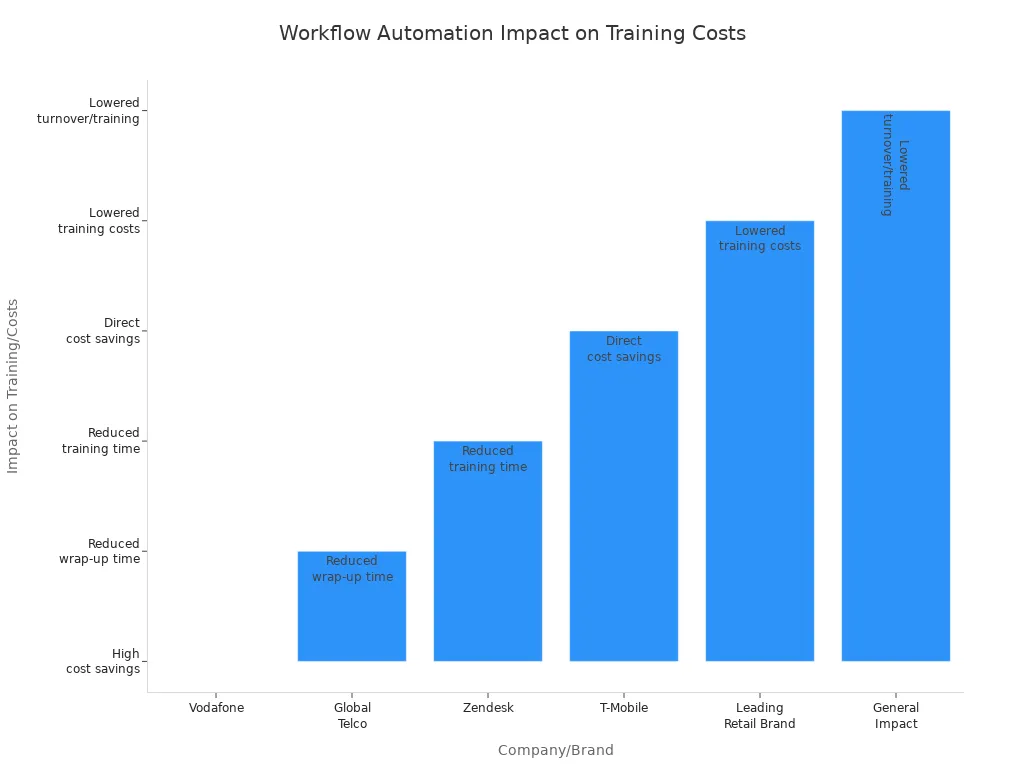
Sobot’s cloud call center platform leverages workflow automation and ai to simplify call center processes. The system automates call routing, data entry, and reporting, which helps businesses reduce manual training tasks and scale efficiently. Automation tools also provide real-time data and insights, supporting continuous process optimization and agent performance management.
Self-Service and Chatbots
Self-service tools and ai-powered chatbots play a vital role in improving training efficiency and knowledge retention. These solutions allow customers to resolve simple issues independently, which reduces call volumes and enables agents to focus on more complex tasks. Sobot’s AI-powered chatbot and IVR systems automate routine inquiries, providing instant responses and freeing agents for higher-value interactions.
- Self-service tools like IVR and knowledge bases empower customers to solve problems without agent intervention.
- AI chatbots handle common queries, automate simple tasks, and support agents with quick access to information.
- These tools improve knowledge retention by reducing errors and supporting communication.
- Automation of routine tasks creates a better environment for agents to learn and focus on complex problem-solving.
Tip: Implementing self-service and chatbot solutions requires clear objectives, user-friendly design, and seamless integration with human support. Regular monitoring and feedback loops help optimize performance and ensure customer satisfaction.
Best practices for deploying self-service and chatbot solutions include defining clear goals, designing intuitive conversational flows, and ensuring accessibility. Companies should also maintain brand consistency, provide easy escalation to human agents, and leverage ai to personalize interactions. Sobot’s omnichannel platform integrates these best practices, offering robust analytics and seamless CRM integration to maximize automation benefits in call center training.
Omnichannel Training Solutions
Unified Agent Workspace
A unified agent workspace stands at the core of effective omnichannel training. Sobot’s omnichannel platform brings together all communication channels—voice, chat, email, and social media—into a single, cloud-based interface. This integration ensures agents receive consistent training and can deliver a seamless customer experience every time.
- Unified workspaces reduce errors and streamline workflows, making training more efficient.
- Agents access customer data, interaction history, and ai-powered tools in one place, which supports real-time decision-making.
- Features like real-time analytics and dashboards help supervisors monitor performance and identify training needs quickly.
Research shows that unified agent desktops improve customer satisfaction by reducing application sprawl and speeding up workflows. For example, Bank AlJazira saw a 37.2% increase in customer satisfaction after unifying their agent workspace. Sobot’s platform uses ai to personalize training content and automate routine tasks, which helps agents focus on delivering high-quality customer service. This approach supports the latest customer service trends and ensures agents can adapt to new channels and technologies with ease.
Multichannel Customer Experience
Delivering a strong omnichannel customer experience requires agents to manage interactions across multiple platforms without losing context. Sobot’s cloud solutions empower agents to switch between channels smoothly, providing customers with consistent and personalized support. The platform’s ai-powered chatbots and voicebots resolve up to 80% of customer issues instantly, which reduces training complexity and speeds up onboarding.
Agents benefit from real-time insights during live interactions, allowing them to adjust their approach and improve customer satisfaction metrics. Customized dashboards track customer experience and satisfaction across all channels, supporting continuous improvement. Sobot’s solutions also address common challenges in omnichannel training, such as adapting to new communication methods and maintaining data security.
A real-world example comes from Agilent, a leader in life sciences. By implementing Sobot’s omnichannel workbench and ai-powered chatbot, Agilent increased customer service efficiency sixfold and achieved a 95% customer satisfaction score. This success highlights how cloud-based, ai-driven omnichannel solutions transform both agent training and the overall customer experience.
Data Insights in Training
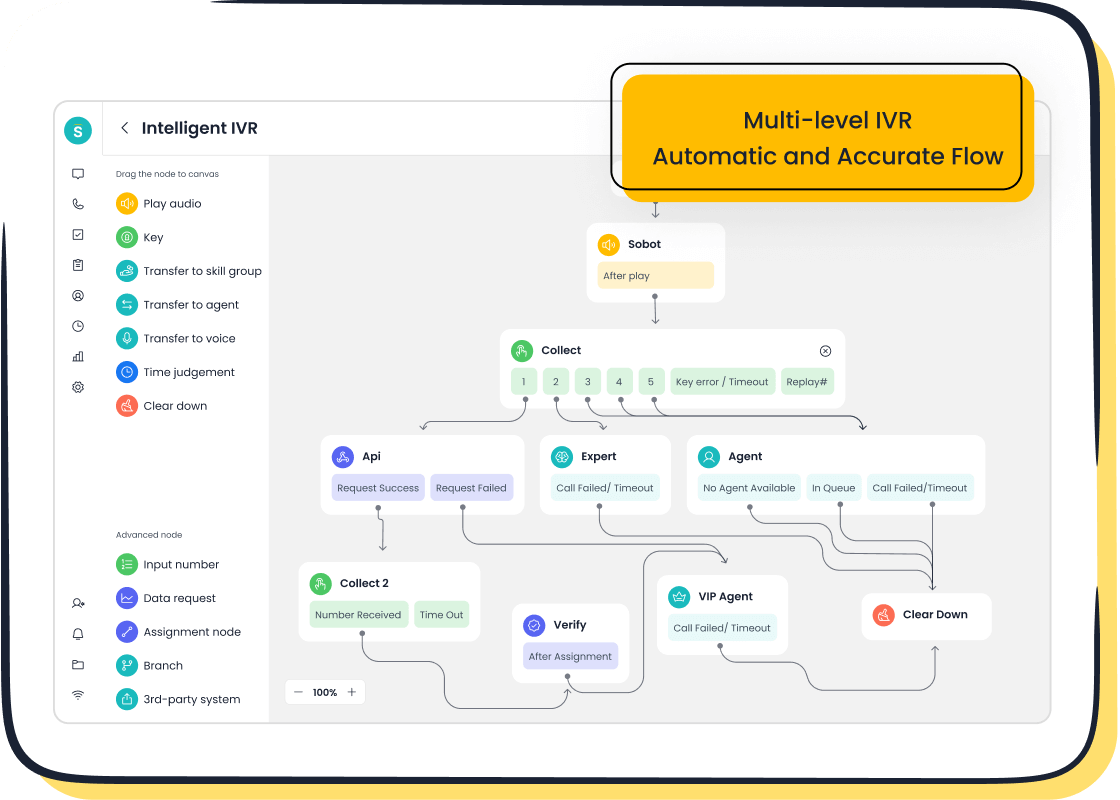
Performance Analytics
Performance analytics play a vital role in call center management. Supervisors use these analytics to track agent progress, identify strengths, and uncover areas for improvement. Effective analytics measure call handling time, customer satisfaction scores, call quality, script compliance, and escalation frequency. Tools like dashboards and real-time monitoring transform raw data into actionable insights. Managers rely on these data-driven insights to deliver immediate coaching and foster continuous improvement.
Sobot’s cloud platform provides advanced performance analytics. The system consolidates key metrics, such as call volume and resolution times, into a unified dashboard. Supervisors can review call recordings and use speech analytics to assess compliance and communication effectiveness. This approach supports personalization through data insights, enabling targeted coaching and training interventions. Over time, tracking agent performance aligns individual growth with team goals and enhances operational efficiency.
Note: Real-time feedback based on performance analytics helps agents improve skills quickly. Managers can compare individual and team results to identify best practices and drive quality across the organization.
Predictive Skill Gaps
Predictive analytics have transformed call center management by proactively identifying skill gaps. These tools analyze agent performance and call data to pinpoint specific weaknesses. Managers then use this information to create personalized coaching plans. AI capabilities in Sobot’s cloud solution enable continuous monitoring and real-time feedback, reducing ramp-up time and improving agent readiness.
- Predictive analytics support personalization by tailoring learning paths to each agent’s needs.
- Data-driven insights from customer interactions and feedback help managers focus training on actual weaknesses.
- Companies see measurable improvements, such as a 27% increase in customer satisfaction and a 25% rise in retention rates.
- AI-driven recommendations reduce average handling time by 56 seconds, boosting overall quality and efficiency.
Personalization through data insights ensures that training remains relevant and effective. Sobot’s cloud-based analytics empower managers to optimize team performance and deliver high-quality customer experiences. By leveraging AI and data-driven insights, call center management can address skill gaps before they impact service quality.
Immersive Technologies
VR and AR Simulations
Immersive technology is changing how call centers train agents. Virtual reality (VR) and augmented reality (AR) create realistic environments where agents can practice customer interactions. Many leading organizations use VR to help agents build empathy, improve communication, and handle emergencies. For example, financial services companies use VR to let agents experience a customer’s environment, which builds understanding and improves service. Retailers use VR to train agents for rare situations, such as emergencies, without risk.
Sobot recognizes the value of immersive technology in agent training. By integrating ai-driven analytics with VR simulations, Sobot helps companies measure skill development and retention. Studies show that VR training increases product knowledge retention by 60% and boosts customer satisfaction ratings by 50%. Employee engagement rises by up to 70% when immersive technology is used. These results highlight the power of combining ai and immersive experiences.
| Metric | Improvement with VR Training | Context / Notes |
|---|---|---|
| Retention rates of product knowledge | 60% increase compared to conventional seminars | From a major tech company’s VR training for customer service agents |
| Customer interaction satisfaction ratings | 50% improvement | Same tech company’s VR training program |
| Employee satisfaction and retention rates | 25% increase | Linked to immersive VR modules with gamified elements |
| Retention rates compared to traditional methods | Up to 75% boost | PwC research across various sectors, highlighting VR’s superior retention over traditional methods |
| Employee engagement increase | Up to 70% boost | Studies indicate immersive experiences significantly raise engagement |
| Job satisfaction and organizational commitment | 82% of employees report increase | Report by Virtual Reality Developers Association |
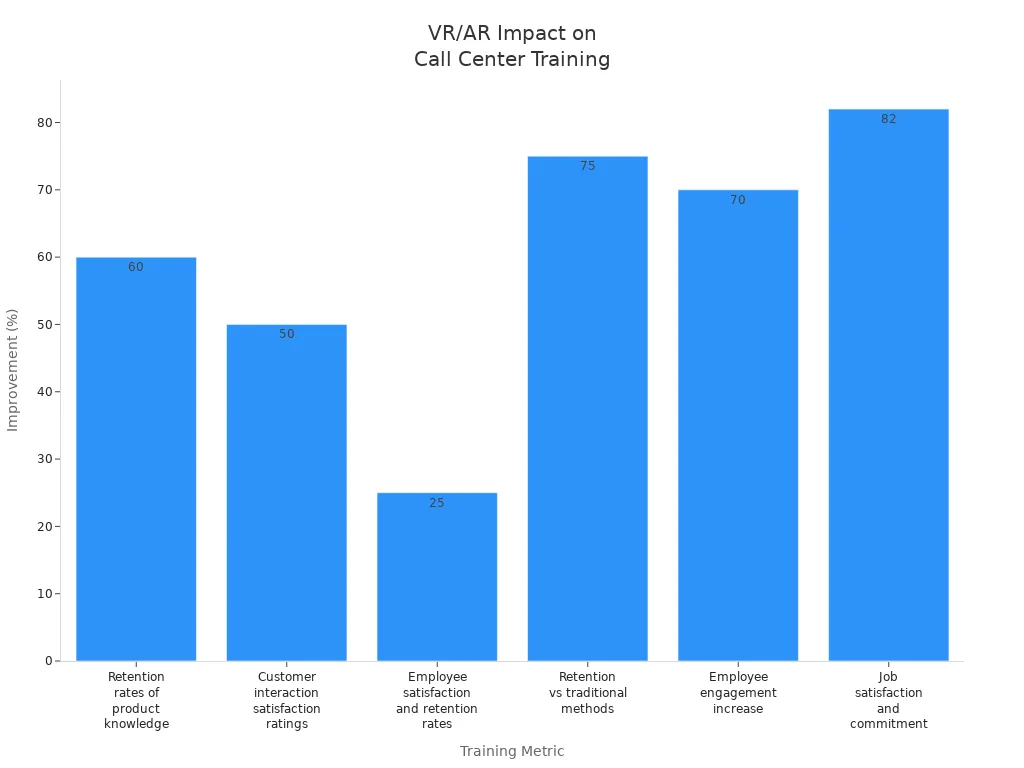
Gamified Learning
Gamified learning uses game elements to make training more engaging. In call centers, gamification motivates agents through points, badges, and leaderboards. Sobot’s ai-powered training modules use gamification to encourage continuous learning and skill mastery. Agents earn rewards for completing training tasks, which increases motivation and reduces absenteeism.
Research shows that gamified learning leads to a 10% increase in calls handled daily and a 12% drop in absenteeism. Knowledge retention jumps from 23% with traditional methods to 89% with gamified activities. Agents feel more connected and strive to improve when they see their progress on leaderboards. Sobot’s technology combines ai with gamified modules, providing real-time feedback and personalized learning paths.
| Impact Area | Evidence of Impact | Explanation |
|---|---|---|
| Agent Motivation | Gamification focused on agent happiness by creating emotionally engaging challenges with badges, points, and levels. | Agents felt empowered and motivated to exceed minimum job requirements, increasing engagement and satisfaction. |
| Productivity | 10% increase in calls handled daily after gamification deployment. | Motivated agents aimed to earn more points, directly boosting productivity. |
| Absenteeism | 12% reduction in absenteeism. | Agents were motivated to attend work to continue earning points and badges. |
| Knowledge Retention | Agent awareness of new information increased from 23% (traditional method) to 89% (gamified activities with simulations). | Gamification with interactive activities and simulations significantly improved knowledge retention and application. |
| Continuous Learning | Gamification supported onboarding, continuous learning, and mastery phases by breaking goals into manageable steps. | This approach maintained motivation and ensured knowledge transfer across all employee experience levels. |
| Social Recognition | Leaderboards and public recognition increased emotional engagement and motivation. | Visible rewards and competition fostered a sense of accomplishment and community among agents. |
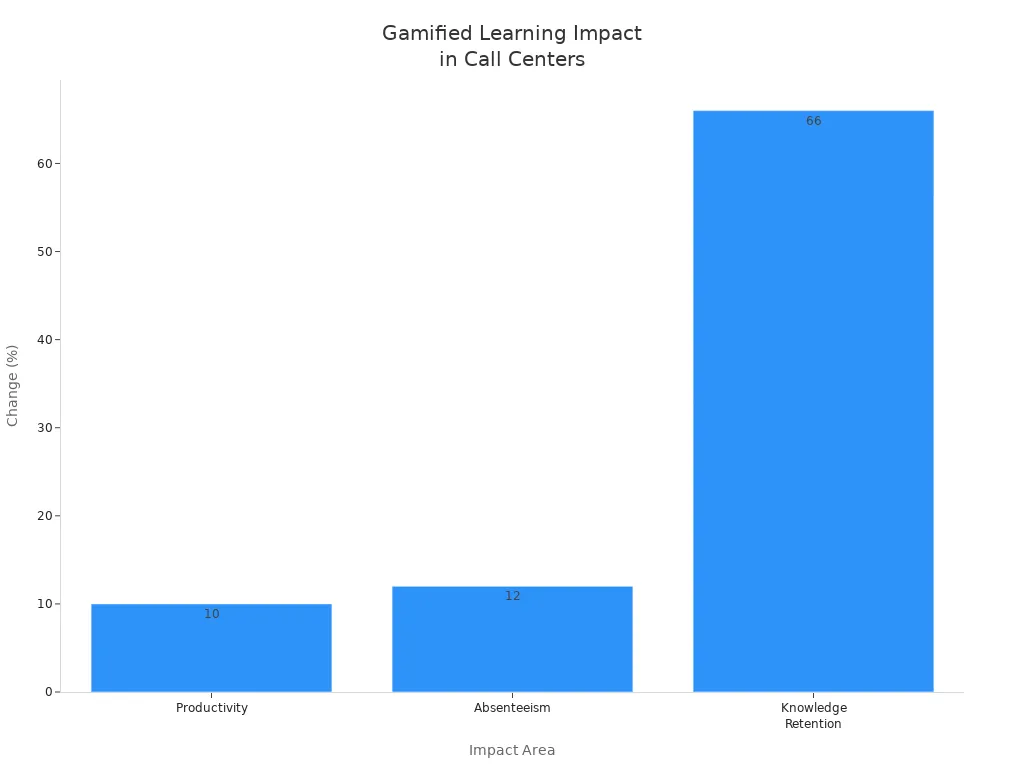
Tip: Gamified learning works best when ai customizes challenges and feedback for each agent. This approach keeps training relevant and engaging, helping agents reach their full potential.
Continuous Learning and Compliance
Microlearning Modules
Microlearning modules have become essential in modern call centers. These short, focused lessons help agents learn quickly and retain information better. Studies show that microlearning addresses limited attention spans and improves comprehension. Agents can access bite-sized content on demand, which supports just-in-time learning. This approach allows rapid updates to training materials, keeping agents current with new technologies and customer behavior.
- Microlearning encourages continuous learning and supports career development.
- Personalized modules target individual needs, closing skill gaps efficiently.
- Interactive formats like videos, quizzes, and flashcards boost engagement and retention.
Emerson and Berge (2018) found that just-in-time microlearning leads to better retention than traditional e-learning. In banking, microlearning improved employee performance and business metrics. Compliance environments benefit from incremental knowledge improvement, as regulations change often. Microlearning enables targeted learning without overwhelming agents. Sobot’s platform supports microlearning by delivering adaptive content and tracking progress with ai-powered analytics. This leads to shorter call handling times and higher first-call resolution rates.
Note: Microlearning fosters a culture of ongoing skill development and employee engagement, which can reduce turnover and improve call center performance.
Soft Skills and Security
Soft skills and security training play a critical role in agent success. Soft skills training enhances communication, problem-solving, and cultural sensitivity. Agents learn conflict resolution, compassion, and patience, which leads to better customer interactions and higher satisfaction. Security and compliance training educates agents on legal requirements such as TCPA, HIPAA, and GDPR. These modules emphasize data protection, confidentiality, and ethical standards.
- Compliance training reduces risks of legal penalties, data breaches, and reputational damage.
- Regular updates and interactive learning keep agents aware of evolving regulations.
- Ai-powered tools provide real-time assistance, automated coaching, and data-driven insights.
Continuous learning programs in call centers enhance agent skills and adaptability. Quality assurance programs offer feedback and targeted coaching. Embedding performance support tools within workflows ensures real-time adherence to policies. Compliance-focused coaching includes real-time call monitoring and scenario practice. Sobot’s ai-driven solutions use call recording, data encryption, and real-time monitoring to support operational efficiency and minimize compliance risks.
A robust compliance checklist covers data protection, script adherence, and disclosure policies. Ai ethics and transparency remain important, especially with regulations like the EU AI Act. Omnichannel compliance requires monitoring across all channels. Sobot’s unified platform helps agents stay compliant and deliver consistent service quality.
Tip: Regular compliance audits and leadership reporting maintain regulatory adherence and identify areas for improvement.
AI and innovation continue to redefine call center training solutions, driving customer service trends and business growth. Companies now see real-time agent assistance, predictive analytics, and unified experiences as essential for call center management. Sobot leads these trends by offering cloud-based platforms that support continuous learning and seamless omnichannel experiences. Industry data shows AI-powered solutions boost customer satisfaction by up to 20% and increase customer lifetime value by 25%. As customer service trends evolve, organizations must embrace new training methods to support growth and deliver exceptional experiences. Sobot’s solutions help future-proof operations and support ongoing business growth.
FAQ
What are the main benefits of AI in call center training solutions?
AI in call center training solutions provides real-time feedback, personalized learning, and faster onboarding. Sobot’s AI-powered Voicebot helps agents handle calls efficiently. Studies show AI can boost customer satisfaction by up to 20% and reduce training time by 30% (Gartner).
How does Sobot support omnichannel call center training solutions?
Sobot’s omnichannel platform unifies voice, chat, email, and social media in one workspace. Agents receive consistent training and access to customer data across all channels. This approach improves agent performance and ensures a seamless customer experience in call center training solutions.
Can automation improve efficiency in call center training solutions?
Yes. Automation streamlines repetitive tasks, reduces manual errors, and accelerates onboarding. Sobot’s workflow automation tools help agents focus on complex issues. Companies using automation in call center training solutions report up to 25% cost savings and faster agent readiness.
Why is data analytics important for call center training solutions?
Data analytics tracks agent performance, identifies skill gaps, and supports targeted coaching. Sobot’s analytics dashboard provides real-time insights, helping supervisors optimize call center training solutions. Data-driven decisions lead to higher customer satisfaction and better team results.
What makes Sobot’s call center training solutions stand out?
Sobot offers AI-driven, cloud-based call center training solutions with 99.99% uptime. The platform supports global operations, integrates with CRM systems, and provides advanced analytics. Sobot’s solutions help brands like Agilent achieve a 95% customer satisfaction score and sixfold efficiency gains.
See Also
A Step-By-Step Guide To Deploy Omnichannel Contact Centers
Best Contact Center Technologies Evaluated For The Year 2024
Effective Strategies For Managing Call Center Quality Standards
Comprehensive Overview Of Omnichannel Software For Call Centers
Understanding The Efficient Functioning Of Call Center Automation
